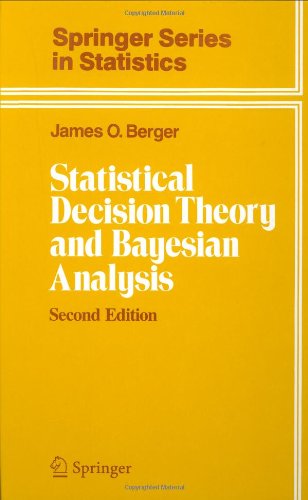Statistical decision theory and bayesian analysis ebook download
Par montgomery floyd le samedi, février 20 2016, 01:26 - Lien permanent
Statistical decision theory and bayesian analysis. James O. Berger

Statistical.decision.theory.and.bayesian.analysis.pdf
ISBN: 0387960988,9780387960982 | 316 pages | 8 Mb

Statistical decision theory and bayesian analysis James O. Berger
Publisher: Springer
Link de Descarga:http://www.ebook-4download.com/2010/10/optimal-statistical-decisions-wiley-classics-library/. This discussion also reminds me of some statistical debates, where many statisticians have argued the need for a decision-theoretic approach to analysis. One of the directions for developing the corresponding methods is the fuzzy classification which applies the main ideas of fuzzy set theory to various classification problems. I explore its value, particularly in its .. Indeed, behaviour in the known and knowable space builds on scientific knowledge, the archetypal example of combined explicit knowledge, that is, scientific models and theories. Berger, statistical decision theory and bayesian analysis. Statistical Decision Theory and Bayesian Analysis (Springer Series in Statistics) by James O. Van der Linde, “Bayesian Measures of Model Complexity and Fit,” J. Statistical Power Analysis In Research. David Snowden's Cynefin framework, introduced to articulate discussions of sense-making, knowledge management and organisational learning, has much to offer discussion of statistical inference and decision analysis. Statistical Decision Theory and Bayesian Analysis. A special very important problem of the statistical machine learning is the classification problem which can be regarded as a task of classifying some objects into classes in accordance with their properties or features. Berger, Statistical Decision Theory and Bayesian Analysis, second ed. Statistical decision theory and Bayesian analysis. It is one of the first comprehensive models that combine statistical decision theory in form of Bayesian analysis with a real options framework for projects exposed to different sources of uncertainty. In a full Bayesian data analysis (with spatial data or not), a loss function should be specified that relates to the decision made from the results of the analysis – the loss function should capture the “consequences” of making a given decision. Mackay, information theory, inference and learning algorithms.